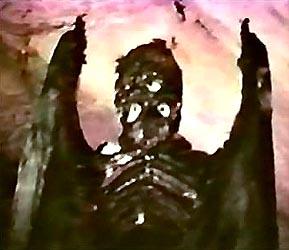A very interesting article by Robert Dreyfuss in the November issue of The American Prospect. There is a definite pro-CIA bias, not surprising since most of his sources were former or current CIA officials. Here are a few excerpts:
Although two "official" inquires have found that CIA analysts were not pressured to provide intelligence to support the Bush adminstrations decision to go to war, the CIA itself dissents. Richard Kerr, a 32 year CIA veteran, was brought out of retirement to lead the agency's own internal review, resulting in four reports that have not been made public. Kerr, however, shared the conclusions with the author of this article.
Since Goss took over, between 30 and 90 senior CIA officials have made their exit, according to various sources, some fleeing into retirement, others taking refuge as consultants.
The agency's vaunted Near East Division, in particular, which served as the "pointy end of the spear," as one CIA veteran put it, in simultaneous wars in Afghanistan, Iraq, and the "global war on terror," has been decimated.
Another former CIA chief of station said: There aren't any Arabists left in the CIA. They're gone. They weren't with the program. It's like Pol Pot, who killed anybody wearing glasses because they might be able to read.
From 2001 on, its covert opertives and analysts were ignored, pressured, and forced to toe the administration's line; neconservative ideologues considered those operatives to be virtually part of the enemy camp. Many of those who remain inside the CIA are distraught, convinced that their work is wasted on an administration that doesn't want to hear the truth."How do you think they feel?" asked one recently retired officer with three decades of experience. "They're watching a fucking idiotic policy, run by idiots, unfold right before their eyes."Emphasis added.
Although two "official" inquires have found that CIA analysts were not pressured to provide intelligence to support the Bush adminstrations decision to go to war, the CIA itself dissents. Richard Kerr, a 32 year CIA veteran, was brought out of retirement to lead the agency's own internal review, resulting in four reports that have not been made public. Kerr, however, shared the conclusions with the author of this article.
"Everybody felt pressure. A lot of analysts believed that they were being pressured to come to certain conclusions ... There were certainly people who felt they were being pushed beyond the evidence they had."Michael Scheuer, who headed the Osama bin Laden unit, had this to say:
"I know a lot of people in the Iraq shop who were dissenting. There were people who were disciplined or taken off accounts ... One gentleman that I talked to, a senior Iraq analyst, regrets to this day that he did not go public."Nonetheless, the CIA got some things right. They concluded that Saddam Hussein did not pose a threat to the U.S. They concluded there there was no connection between Iraq and Al Qaeda, or between Iraq and 9-11. They concluded that Iraq was not even close to developing nuclear weapons. And they concluded:
Long before the war, the CIA told the White House that if the United States invaded Iraq and carried out a prolonged occupation, it would spark an insurgency like the one now tearing Iraq apart.It has been clear for at least two years that Bush has pissed of the CIA, which usually does not end well for American presidents. I will close with one last excerpt:
Having clashed early with the Directorate of Operations, Goss has alienated--some say irreparably--the heart of the CIA: its clandestine service.Clearly the Bush adminstration did not go to war because the CIA provided bad intelligence. They found the intelligence they wanted to support a decision already made. When the CIA was not sufficiently cooperative they created the Office of Special Plans in the Pentagon. As the Guardian reported more than two years ago:
www.guardian.co.uk/Iraq/Story/0,2763,999737,00.htmlAccording to former Bush officials, all defence and intelligence sources, senior administration figures created a shadow agency of Pentagon analysts staffed mainly by ideological amateurs to compete with the CIA and its military counterpart, the Defence Intelligence Agency.
The agency, called the Office of Special Plans (OSP), was set up by the defence secretary, Donald Rumsfeld, to second-guess CIA information and operated under the patronage of hardline conservatives in the top rungs of the administration, the Pentagon and at the White House, including Vice-President Dick Cheney.



1 Comments:
Great Post.
Post a Comment
<< Home